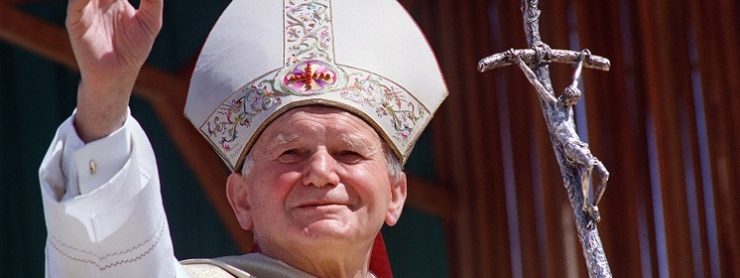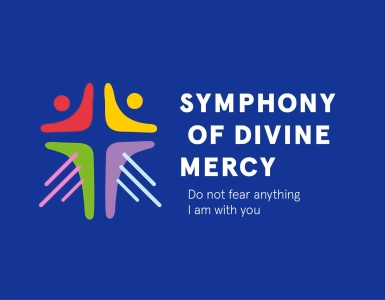The first Papal pilgrimage to his homeland was a turning point for Poles enslaved by communism. The call of John Paul II for the descent of the Holy Spirit was reflected in the spiritual awakening of the nation and the huge social movement. The visit in his Homeland was crowned by his stay in Cracow, where the tradition of meetings with young people on Franciszkańska 3 started.
On June 8, 1979, after closing the Wawel Cathedral’s meeting of the Pastoral Synod of the Archdiocese of Krakow, John Paul II went to Skałka, where he met with people of culture, science and art. In the courtyard of the sanctuary, as well as on the surrounding trees and roofs, young people gathered waiting for the arrival of the Holy Father. The Pope, seeing the enthusiasm and joy of young people, gave up the official, previously prepared speech and entered into a lively, improvised dialogue with them.
– It was a meeting full of friendship. It began with the song ‘Barka’. This type of meetings – in the form of a direct conversation – reached its peak when the youth came in the evening and gathered under the window on Franciszkańska 3 and somehow “called” it. No one was prepared for such a meeting at the time. A chair was put next to the window. In an improvised way, John Paul II stood on the windowsill and began to talk to young people who were bursting with laughter every now and then – says Krakow Metropolitan Marek Jędraszewski and adds that it was the time before the May 13th attack, when the Holy Father broke the distance barrier and sought personal contact with the faithful.
– The assassination attempt showed how much he was a rival the communist world. No one had the feeling that some misfortune could affect him. He was in an open car. The paradox of those times was that everything was done not to show how many people came to the meetings – the media was only depicting the periphery, fences, bored security people and older people. They did not want to show that young people were attending the meetings.
The Archbishop reminded that John Paul II loved young people and demanded a lot from them. When World Youth Day took place in Rome in 2000, church hierarchs wondered how a sick and elderly man could attract so many young people.
– Cardinal Ryłko said at the time that young people know that the Pope loves them, and if he loves, he also demands from them. He shows what it is to be a father and an educator, and they show what they expect from their father – they do not want a partner relationship, but someone who is a genuine authority for them.
On June 9, John Paul II visited the monastery of Cistercians in Mogiła – Nowa Huta. In his homily, the pope outlined the history of two crosses – the Mogiła cross that has been standing over the area since the 13th century and the new one – Nowa Huta. He pointed out that it is impossible to separate Christ and His cross from human work. John Paul II, recalling the time when, as the Krakow’s Bishop and Cardinal, he fought for the creation of churches in this district, he called himself the builder of Nowa Huta on the foundation of Christ’s cross.
– He put in the history of Nowa Huta his very important part, which is the truth about the cross and the life of a man, worker, employee who is not a tool in the production cycle, but must be respected as someone who contributes a lot to the general good. The cross contains the truth about martyrdom and martyrs whose blood is the seed – as Tertullian said – of the Church. This history of the cross includes the blood of people who, for the existence of the cross in Nowa Huta, suffered and sometimes gave their lives. Thanks to this, there are more priestly vocations from the area of Nowa Huta than from the old bourgeois Kraków.
Archbishop Marek Jędraszewski pointed out that the fruits of the papal pilgrimage were very abundant. The faithful were convinced that victory is built on the strength of Christ’s cross. Construction of new churches and pastoral centers began with greater strength and determination. The nation awakened spiritually, which was reflected in a record number of believers in Krakow’s Błonia, where John Paul II said goodbye to his homeland and his countrymen.
– He drew attention to passing that man wants to oppose through the development of civilization, culture, technology. These achievements, however, are not enough – man needs God (…) The Holy Father referred in his homily to his stay in Gniezno at the grave of St. Adalbert. He said that his martyrdom was a kind of baptism through blood. In Krakow he referred to St. Stanisław and to the confirmation. In St. Stanisław Bishop and Martyr, he emphasized courage and his perseverance in faith, as well as its maturity, which faces us as a task to remain in it and be ready to bear all the consequences.
The Pope emphasized that Poland is a wonderful heritage that must be explored and passed on to future generations: ” So, before going away, I beg you once again to accept the whole of the spiritual legacy which goes by the name of “Poland”, with the faith, hope and charity that Christ poured into us at our holy Baptism. I beg you – never lose your trust, do not be defeated, do not be discouraged; – do not on your own cut yourselves off from the roots from which we had our origins. I beg you – have trust, and notwithstanding all your weakness, always seek spiritual power from him from whom countless generations of our fathers and mother have found it; -never detach ourselves from him;- never lose your spiritual freedom, with which “he makes a human being free”.
– The final passages were poignant when the Pope said that he was looking at Krakow and the great heritage called Poland. Finally, he appealed to the Poles not to give in to discouragement, the belief that nothing can be done, and to take our heritage, deepen it and pass it on to future generations. It was a message of hope (…) Saying goodbye to Poland, a very important message was said, which is still valid today, when one tries to break and ridicule Polish identity – we need to remain with Christ, Who feeds us with the truth of the Gospel and His body, leading to eternal life.





